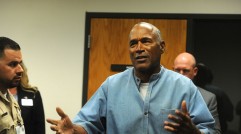Obama on Net Neutrality Quotes: President Calls for 'Free and Open' Internet, Recommends FCC to Adopt Four Steps
President Barack Obama recommitted his position on the net neutrality debate, calling for the Federal Communications Commission (FCC) to enact new rules to secure a "free and open" Internet.
The issue of "net neutrality," according to Obama, has been "built into the fabric of the Internet since its creation." The president claimed an "open Internet" is important for the U.S. economy, and it should be a principle not taken for granted.
"We cannot allow Internet service providers (ISPs) to restrict the best access or to pick winners and losers in the online marketplace for services and ideas," Obama said, acknowledging the four million public comments on net neutrality to the FCC.
Obama reiterated his stance on net neutrality, a topic he spoke on during his presidential candidacy. He said his commitment for a "free and open Internet" remains "strong as ever."
"The FCC is an independent agency, and ultimately this decision is theirs alone," Obama said. "I believe the FCC should create a new set of rules protecting net neutrality and ensuring that neither the cable company nor the phone company will be able to act as a gatekeeper, restricting what you can do or see online. The rules I am asking for are simple, common-sense steps that reflect the Internet you and I use every day, and that some ISPs already observe."
Obama outlined four steps for the FCC to consider. The first step includes the ISPs not blocking a website or service from a consumer. The second rule is for ISPs to not intentionally decide to slow down or speed up content. The third step are for better transparency between the ISPs and the Internet as recently upheld by a court order. Fourth, Obama wants a ban on paid authorization or any restriction that could undermine the "level playing field' for the Internet's growth.
"If carefully designed, these rules should not create any undue burden for ISPs, and can have clear, monitored exceptions for reasonable network management and for specialized services such as dedicated, mission-critical networks serving a hospital. But combined, these rules mean everything for preserving the Internet's openness," Obama said, noting the steps should include mobile devices.
For the steps to be implemented, the FCC has to reform Title II of the Telecommunications Act of 1996.
"If the FCC appropriately forbears from the Title II regulations that are not needed to implement the principles above -- principles that most ISPs have followed for years -- it will help ensure new rules are consistent with incentives for further investment in the infrastructure of the Internet," Obama said.
The White House also released a video on "Keeping the Internet Open and Free."
"Ever since the Internet was created, it's been organized around basic principles of openness, fairness and freedom. There are no gatekeepers deciding which sites you get to access. There are no toll roads on the information superhighway," Obama said, adding that "abandoning" such principles would threaten the Internet and innovators an opportunity to thrive.
Obama also published a tweet about his plan on Twitter from the White House account.
I'm urging the @FCC to keep the internet open and free. Here's my plan to protect #NetNeutrality for everyone: https://t.co/3y3YLQD6MB -bo
— The White House (@WhiteHouse) November 10, 2014
"Americans are making their voices heard and standing up for the principles that make the Internet a powerful force for change," Obama said in the video. "As long as I'm president, that's what I'll be fighting for too."
__
For the latest updates, follow Latin Post's Michael Oleaga on Twitter: @EditorMikeO or contact via email: m.oleaga@latinpost.com.
Subscribe to Latin Post!
Sign up for our free newsletter for the Latest coverage!














